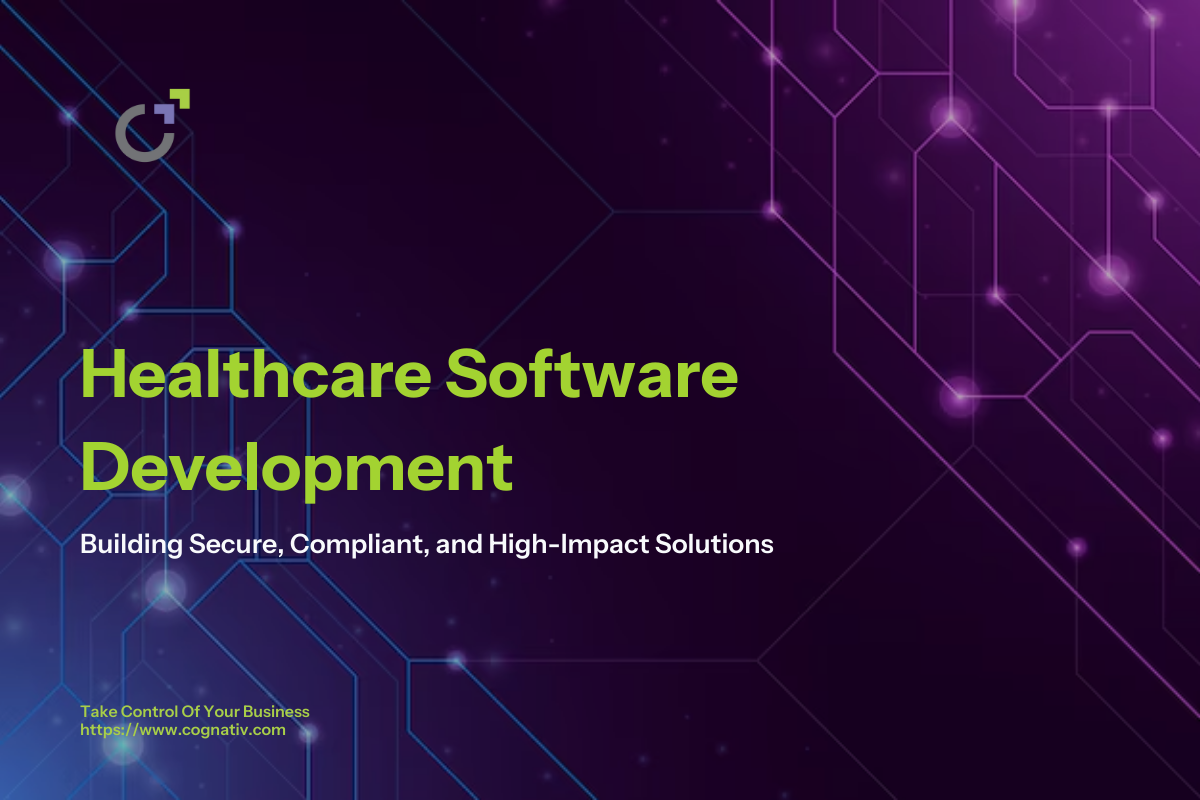Healthcare Software Development: Building Secure, Compliant, and High-Impact Solutions
The healthcare landscape is undergoing rapid digital transformation as providers and care organizations seek to optimize operations, improve patient outcomes, and keep pace with ever-changing regulatory demands. Custom healthcare software development stands at the forefront of these efforts, offering powerful, personalized solutions that align precisely with a medical provider’s workflow.
Whether you operate a standalone clinic, a hospital network, or a health tech startup, robust custom applications can facilitate care coordination, data analytics, digital therapeutics, and much more.
In this guide, we explore the nuances of building bespoke medical software. We’ll unpack the importance of in‑house vs. outsourced development, how Agile shapes the healthcare technology lifecycle, and why software tailored to healthcare’s unique challenges can deliver greater data security and regulatory compliance than off‑the‑shelf alternatives.
Table of Contents
- Why Custom Healthcare Software Development Matters
- Key Advantages of Tailored Solutions in Healthcare
- The Primary Advantage of In-House Development for Healthcare Organizations
- When to Consider Outsourcing to a Custom Healthcare Software Development Company
- Agile in Healthcare: Why It’s Essential
- Best Practices for Healthcare Software Development
- Choosing a Partner: Traits of a Reliable Healthcare Software Development Company
- Conclusion

Why Custom Healthcare Software Development Matters?
What is the primary advantage of in‑house development of software by healthcare organizations? It’s the control and deep familiarity with internal workflows. But that’s only part of the broader answer—healthcare software solutions, whether built internally or via an external healthcare software development company, must prioritize seamless care delivery, improved outcomes, data security, and regulatory compliance.
Off‑the‑shelf tools often miss niche requirements or hamper future flexibility. In contrast, custom healthcare software development can integrate unique features—such as AI‑driven diagnostics, remote patient monitoring, or advanced analytics—while ensuring complete alignment with clinical workflows, EHR/EMR ecosystems, and compliance protocols like HIPAA, GDPR, or MDR.
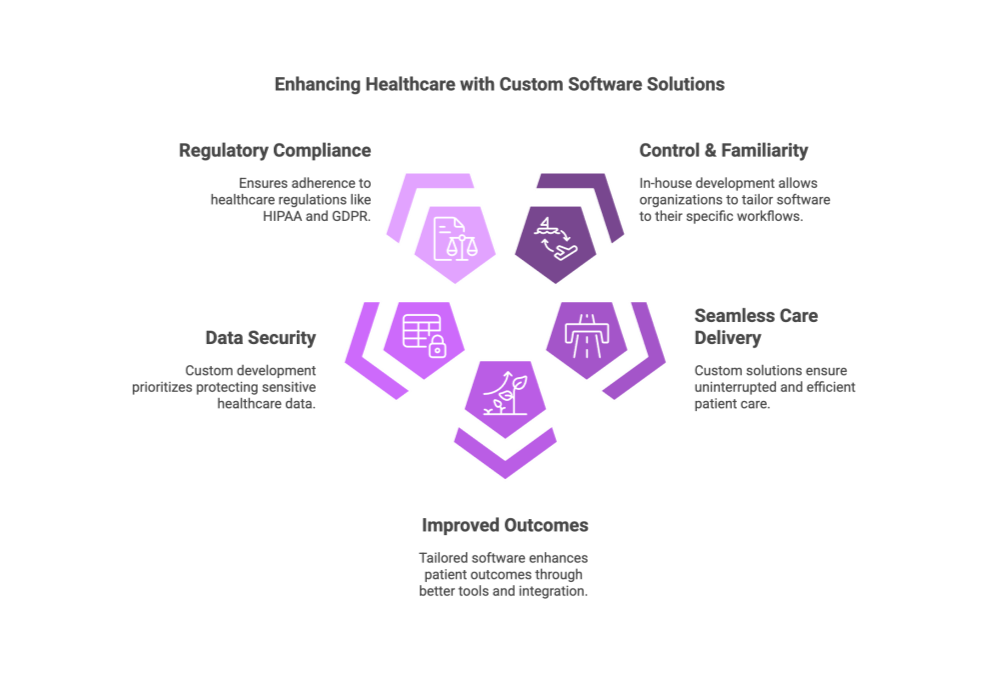

Key Advantages of Tailored Solutions in Healthcare
Custom healthcare software development is important because it provides solutions that fit the exact operational requirements of a healthcare organization. Some key advantages include:
- Exact Fit for Clinical Processes: Every healthcare organization has distinct workflows; custom solutions are mapped precisely to prevent confusion and streamline operations.
- Enhanced Patient Outcomes: Tailored applications can incorporate advanced telemedicine, timely medication reminders, or AI‑based risk assessments, leading to improved engagement and reduced readmissions.
- Stringent Compliance: Custom code can ensure robust data encryption, role‑based access, and transparent audit trails that align with HIPAA and other regulations.
- Scalability and Adaptability: A custom MVP can be rapidly evolved—adding new modules for different specialties or integrating emerging IoT devices—without facing the limitations of generic software.
- Competitive Differentiation: A well‑designed, user‑friendly system elevates brand reputation and delivers value that off‑the‑shelf solutions often lack.
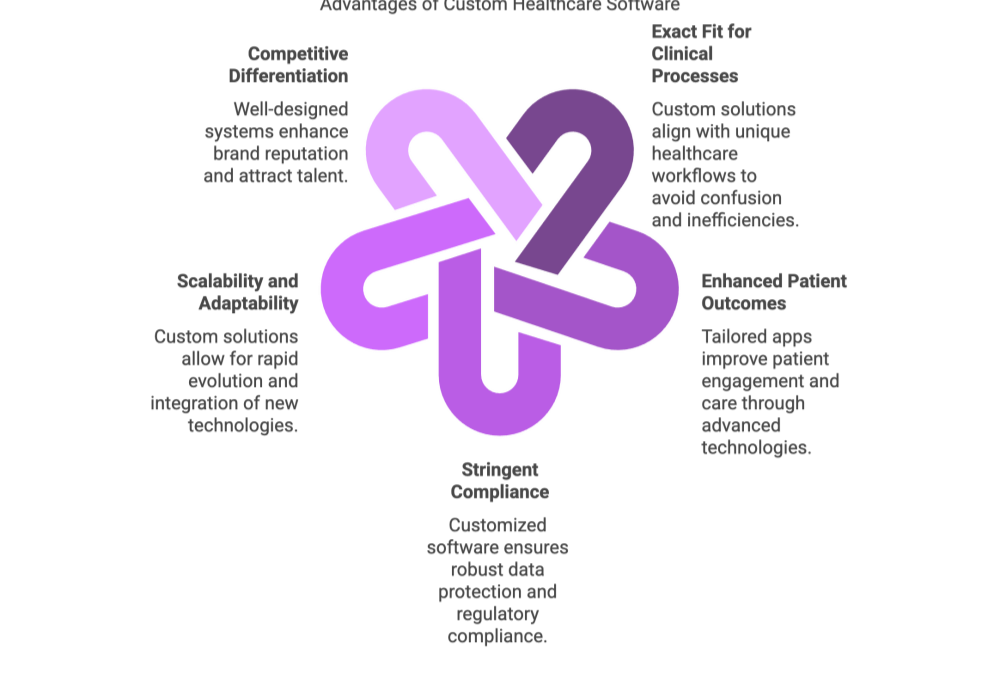

The Primary Advantage of In-House Development for Healthcare Organizations
In 2025, healthcare organizations face complex and shifting demands, including new compliance updates, EHR interoperability, and advanced patient engagement. The primary advantage of in‑house development lies in:
- Direct Oversight & Rapid Iterations: A dedicated in‑house dev team can respond instantly to clinician feedback or urgent regulatory changes.
- Deep Domain Expertise: Internal developers possess intimate knowledge of daily tasks, user preferences, and data flows unique to their organization.
- Sensitive Data Control: Handling software development internally can limit data exposure to external vendors, enhancing security.
- Long-Term Ownership: Proprietary solutions ensure continuity and independence from third-party vendor roadmaps or licensing fees.
However, building an in‑house team can be costly, especially when specialized technologies such as AI or AR/VR in surgery are involved. Talent acquisition and retention challenges often lead providers to weigh the benefits of external partners.
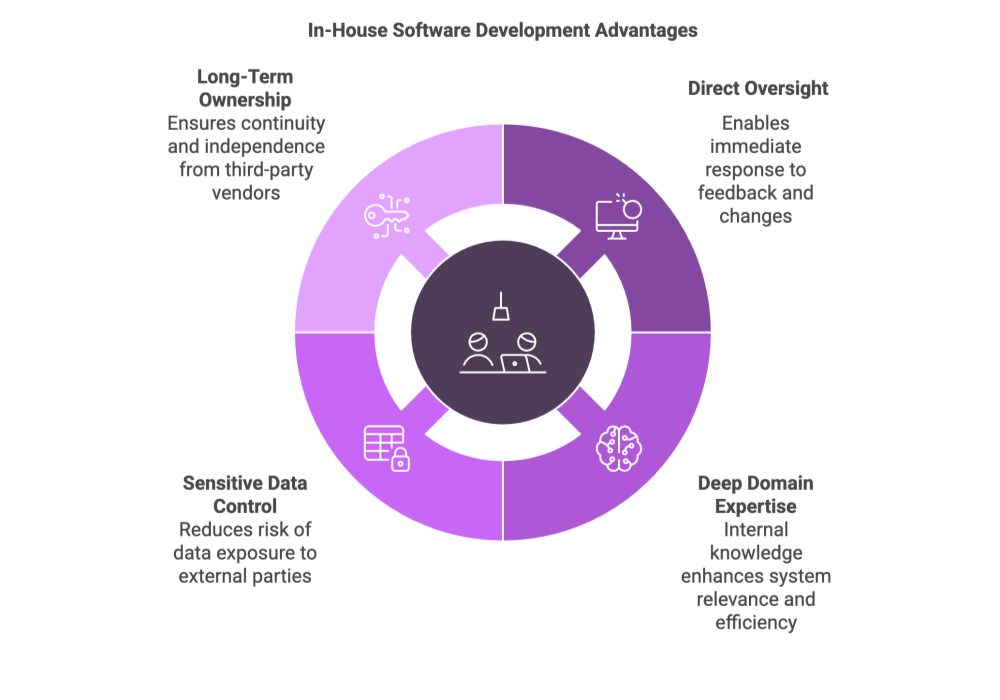

When to Consider Outsourcing to a Healthcare Software Development Company?
For many healthcare providers, outsourcing software development offers an attractive alternative to building an in‑house team. Key considerations include:
- Budget Constraints: Maintaining a full internal team with specialized experts is costly. Outsourcing can be more cost-effective, especially for short-term or niche projects.
- Need for Specialized Skills: Advanced telehealth, IoMT data ingestion, or AI‑based medical solutions often require expertise that can be accessed on demand from a seasoned partner.
- Tight Timelines: For rapid MVP launches, such as pilot telemedicine platforms, external teams with established frameworks and compliance knowledge can accelerate time-to-market.
- Broad Regulatory Expertise: External partners specializing in healthcare software stay abreast of regulatory changes across regions, ensuring compliance.
- Scalability: Outsourcing allows for flexible scaling—adding resources during peak project phases and scaling down during maintenance.
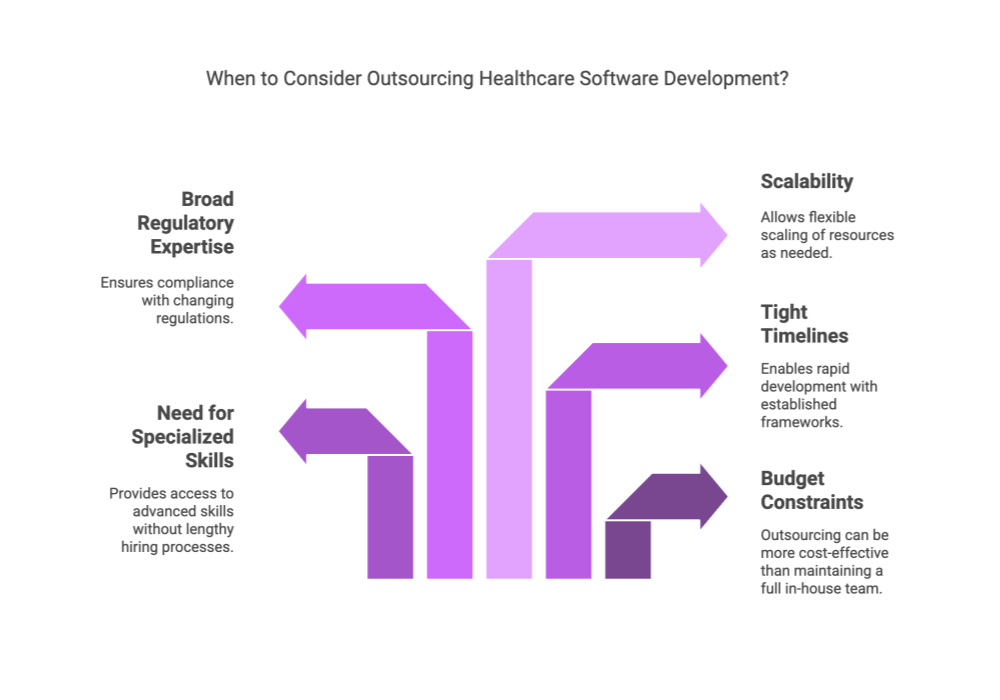

Agile in Healthcare: Why It’s Essential?
Agile methodologies are particularly well-suited for healthcare software development due to their ability to incorporate continuous feedback and adapt to rapidly changing requirements. Key reasons why Agile is essential include:
- Continuous Feedback & Rapid Prototyping: Early versions of the software can be tested by healthcare staff, enabling quick iterations based on real-world usage and feedback.
- Flexibility in Evolving Requirements: Healthcare applications must adjust to regulatory updates, new device standards, and internal policy changes with minimal disruption.
- Reduced Risk: Frequent, incremental releases allow for early detection and resolution of critical issues, ensuring stable and secure software adoption.
- Empowered Clinician Engagement: Involving doctors, nurses, and administrators in the development process ensures that the final product is truly user-centric and aligned with clinical needs.
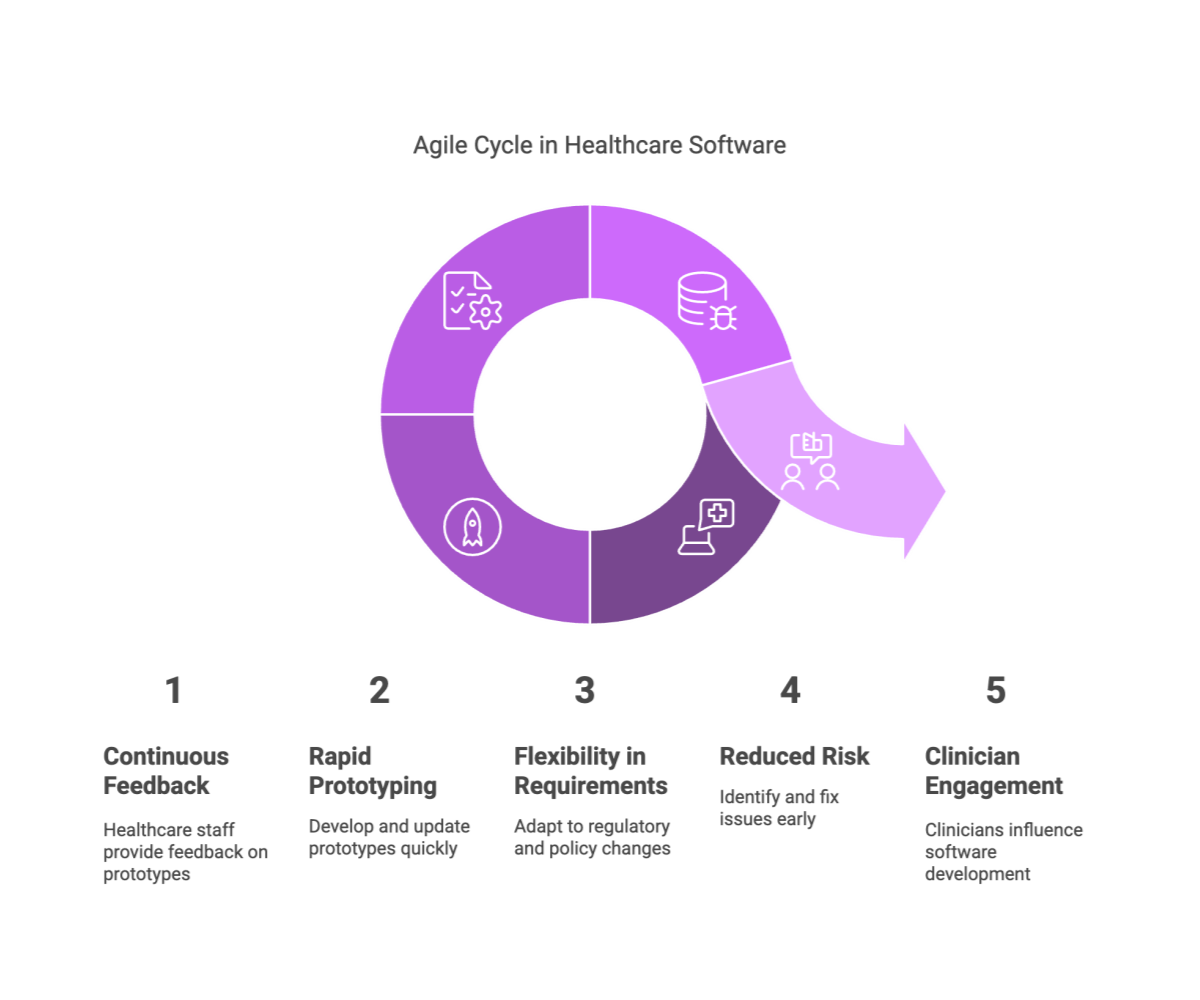

Best Practices for Healthcare Software Development
Successful healthcare software development demands a focus on several key best practices to ensure both operational efficiency and regulatory compliance. Consider the following guidelines:
- Secure PHI: Implement strong encryption (TLS for data in transit, AES-256 for data at rest), role-based access, multi-factor authentication, and comprehensive audit logs to ensure HIPAA compliance.
- Interoperability: Adopt standards such as HL7 FHIR or DICOM to facilitate seamless data exchange between laboratories, imaging centers, and external EHR systems.
- CI/CD & Automated Testing: Regular code scans, vulnerability assessments, and automated regression tests minimize deployment errors and keep the system compliant.
- User Experience Design: Design intuitive, streamlined interfaces that reduce complexity for medical practitioners, ensuring minimal clicks and clear workflows.
- Scalable Architecture: Utilize microservices, containers (Docker, Kubernetes), or serverless back-ends to handle usage spikes and evolving system demands.
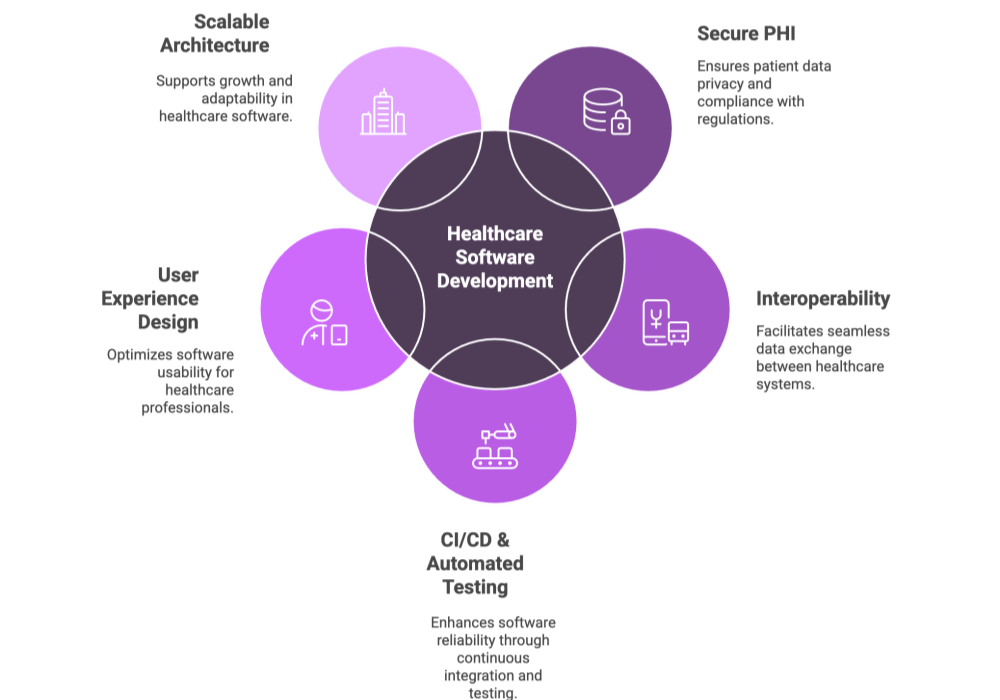

Choosing a Partner: Traits of a Reliable Healthcare Software Development Company
When selecting a development partner for your healthcare software project, it is essential to consider several traits that indicate reliability and expertise. Key factors include:
- Domain Mastery: A proven portfolio featuring telemedicine, EHR/EMR integrations, or medical device software projects, along with client references attesting to successful compliance handling.
- Regulatory Knowledge: A deep understanding of HIPAA, GDPR, and other local data protection laws is critical. In the US, familiarity with FDA and ONC guidelines is also important; in the EU, adherence to MDR or IVDR can be crucial.
- Agile Approach: The ability to collaborate seamlessly through agile practices, including daily stand-ups, transparent backlog management, and sprint demos, ensures the project stays aligned with your evolving needs.
- Security-First Mindset: Look for a partner that prioritizes secure coding practices, regular third-party audits, and comprehensive vulnerability assessments.
- Ownership & Contracting: Clear terms regarding IP ownership, well-defined NDAs, and BAAs (Business Associate Agreements) are essential for protecting your interests.
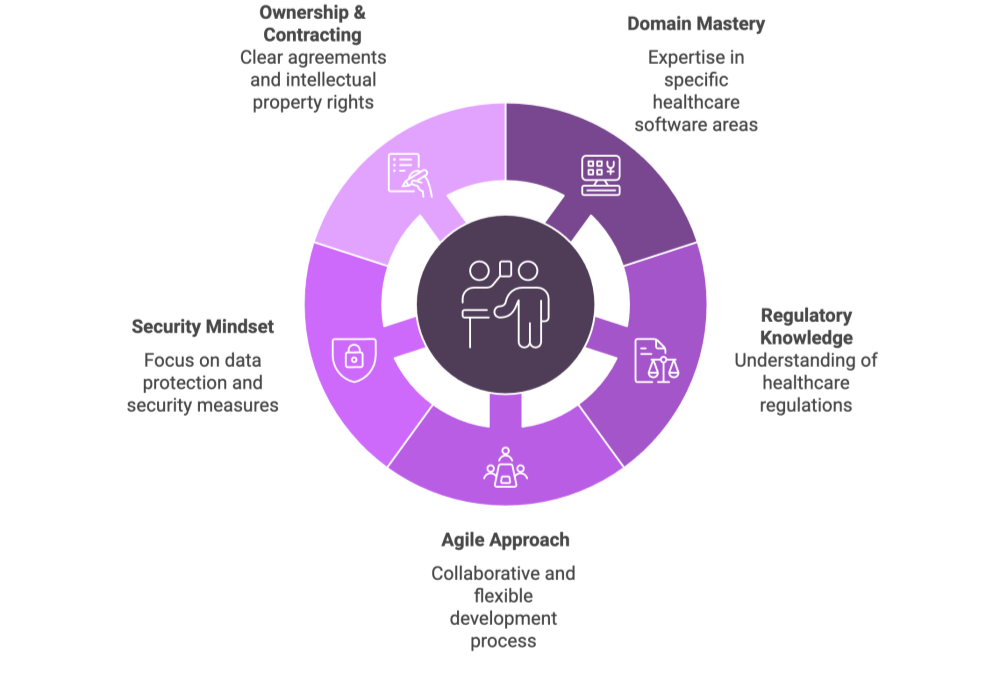

Conclusion
Custom healthcare software development is no longer a “nice-to-have” but a strategic imperative for medical providers and health tech innovators in 2025. Tailored solutions—whether they take the form of telehealth portals, remote patient monitoring systems, advanced EHR integrations, or AI-based diagnostics platforms—drive better patient outcomes, streamline care delivery, and ensure robust regulatory compliance.
What is the primary advantage of in‑house development for healthcare organizations? It is the deep control over workflows and data that fosters seamless care coordination. However, for many providers, the specialized skills and agile methodologies offered by a reliable external partner can yield faster innovation, enhanced security, and significant cost savings.
Whichever approach you choose—whether building internally or outsourcing—a user‑centric, agile, and security‑focused strategy is key. In healthcare, where the stakes are incredibly high, the difference between a well‑engineered system and a rushed build can have life‑changing consequences. By aligning your technical ambitions with clinical needs, you not only develop a successful application but also positively impact patient care and operational efficiency.

Get in Touch With Us
At Cognativ, we specialize in building secure, compliant, and high-impact healthcare software solutions that drive improved patient outcomes and operational excellence. Our team of experts understands the unique challenges of the healthcare sector and is dedicated to delivering custom applications tailored to your clinical workflows and regulatory requirements.
If you’re ready to explore how a bespoke healthcare software solution can transform your organization, contact us today. Let’s work together to build technology that not only meets your current needs but also paves the way for future innovations in patient care and digital health.

